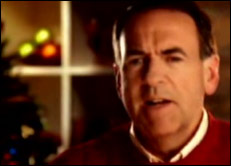|
|
A realist President Huckabee would focus in his war on terror and more generally in his defense strategy on non-state actors like al-Qaeda because they undermine the nation-state system and directly threaten America. By far the neophyte on foreign policy, Huckabee plugs nation-state analysis and power politics whenever possible. Furthermore, he is somewhat simplistic when upholding the realist status quo, reaffirming strategic military ties to Israel and pledging support for the proposed missile defense system in Poland and the Czech Republic.
Unlike others who disparage diplomacy, like former U.S. ambassador to the United Nations John Bolton, Huckabee sees diplomacy and dialogue as a policy strategy worthy of pursuit. This sets him distinctly apart from Giuliani and Romney, who both boast a military prowess to usurp their presidential predecessor's performance. But make no mistake, Huckabee's firepower is aimed and ready, and al-Qaeda's presence, whether in Afghanistan or Algeria, will be targeted.
His preference for diplomacy and dialogue with Iran fits strategically within a realist framework. According to Huckabee, a U.S. military defeat of Shiite-led Iran would give Sunni-led al-Qaeda a clear hold over the Middle East, a region that both leaderships are intent on dominating. Regardless of the Iran-versus-al-Qaeda balance-of-power rationale, Huckabee distinguishes himself from his Republican rivals on this point, garnering votes from realists long disillusioned with President Bush's military overreach.
Under a heroic conservative President Huckabee, foreign aid funding, already a negligible amount at roughly one percent of the entire U.S. federal budget, will likely be strengthened, not cut. The poor -- or, as Huckabee likes to reference Jesus Christ, "the least of these" -- whether in east Africa, southeast Asia, or east LA will get his undivided attention. After destroying terrorist groups, Huckabee will counter the conditions that breed them, or in his words, "the lack of basic sanitation, health care, education, jobs, a free press, and fair courts -- which all translates into a lack of opportunity and hope." The sequence is suspect: how many people would have to be eliminated before President Huckabee began to address the underlying conditions? Nevertheless, his concern for the root causes of violence is meritorious.
On all these, Huckabee is the true compassionate conservative. Few Republican candidates have shown the slightest proclivity for poor-friendly policies. Huckabee is no doubt strategic in his references to Jesus Christ and the New Testament, a poor-friendly message he knows resonates among devout and holiday-attending Christians and compassionate conservatives. But despite the strategic political value of quoting Christ, Huckabee actually seems to believe the message too. This is wise as most Americans want to help the poor.
Under a social conservative President Huckabee, faith and traditional morality will likely frame much of his foreign policy protocol, particularly within the Muslim world. To Huckabee's credit, his pro-life stance, one major component of social conservatism, is all-embracing. He prefers to see "pro-life" within the context of one's entire life span, not simply from conception to birth. Thus, his pro-life stance includes, in his words, "quality education, first-rate healthcare, decent housing in a safe neighborhood, and clean air and drinking water." No other Republican candidate is so comprehensively social-minded when it comes to pro-life issues, setting Huckabee apart yet again.
 | |
The controversial Huckabee holiday greeting, which many said contained a coded message in the image of the cross made by lighting on a background bookshelf
|
Huckabee is less forgiving, however, with non-Christian social conservatism. Clashes could take place between a President Huckabee and Muslim political parties abroad preaching similar values. Huckabee seems to be taking his religion policy cue cards from CNN's series on "God's Warriors." He quotes near verbatim from the news network's analysis of Sayyid Qutb, the late Egyptian author of Social Justice in Islam, who wrote in his book that "Christ (upon whom be peace) came only to preach spiritual purity, mercy, kindness, tolerance, chastity and abstinence." Like Huckabee's commitment to caring for the "least of us," Qutb's concern lies in the persistence of gross economic inequality in Muslim societies. Yet despite these apparent similarities and potential points for Christian-Muslim partnership, the social conservatism of a White House Huckabee will be distinctly Christian, to the potential exclusion of others. On this, Huckabee is hardly alone, with Giuliani and Romney going further, coming close to denouncing Islam altogether.
But perhaps more important than any of the previous points regarding Huckabee's triple threat of heroic conservatism, realism, and social conservatism, is the candidate's tone. Many Americans are exhausted by President Bush's military overreach and aggressive intervention strategies and Giuliani and Romney promise more, not less, of the same. Huckabee, however, strikes a different deal with the public. Using a domestic analogy to describe his foreign policy, which either was an attempt to make it more understandable or a slip of a neophyte hand, Huckabee said recently, "Much like a top high school student, if [the United States] is generous in helping others, it is loved. But if it attempts to dominate others, it is despised." This principle is visible in Huckabee's policies on everything from immigration to Iraq. He is the least isolationist of the top Republican contenders, providing free education to hard working youth of undocumented workers. And he said recently that the U.S. occupation destroyed the country politically, economically, and socially.
Whatever the cause, Huckabee is now a serious candidate clearly capable of taking Iowa and New Hampshire. In response, fellow candidates Giuliani and Romney should take a lesson from the Huckabee appeal: more poor-friendly policies, more diplomacy and dialogue, and a more comprehensive understanding of what it means to be "pro-life." Even if Huckabee fades, perhaps his contribution to the tone of the debate will live on: more helping and less haranguing.
Article courtesy Foreign Policy in FocusMichael Shank is an analyst with the Institute for Conflict Analysis and Resolution at George Mason University
Comments? Send a letter to the editor.Albion Monitor December
31, 2007 (http://www.albionmonitor.com)All Rights Reserved. Contact rights@monitor.net for permission to use in any format. |
|






